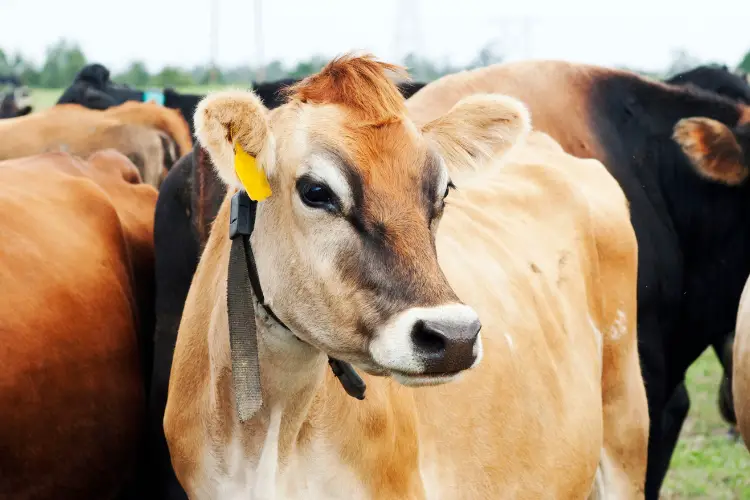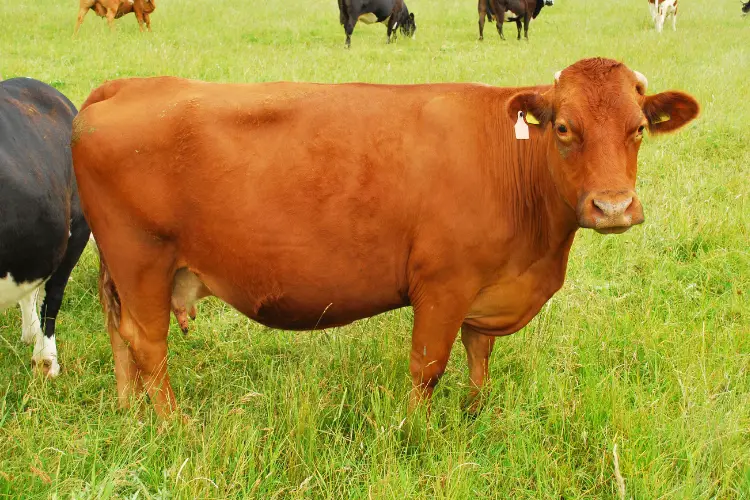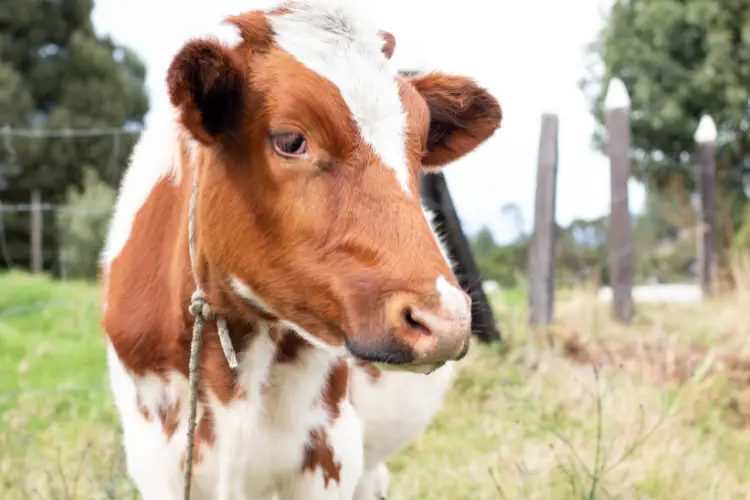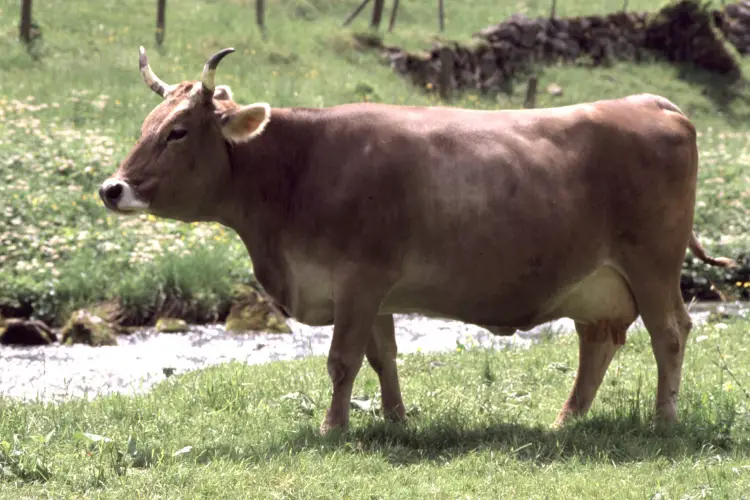Small farms looking to venture into dairy farming need to choose their cattle breeds wisely. Selecting the right breed can significantly impact productivity, profitability, and the overall success of the farm.
In this blog post guide, we will explore about the top five dairy cattle breeds that are ideal for small farm operations, focusing on their unique characteristics and advantages for small-scale dairy production.
Key Takeaways
- Holsteins are renowned for their high milk production, making them a top choice for dairy farmers seeking maximum yield.
- Jersey cows are celebrated for their rich, creamy milk with high butterfat content, perfect for premium dairy products.
- Guernsey cattle offer a balance of high-quality milk and moderate production levels, suitable for diverse dairy operations.
- Ayrshire cows are known for their resilience and adaptability to various climates, providing reliable production.
- Brown Swiss cattle boast longevity and sturdy constitutions, along with impressive milk quantity and quality.
1. Holstein

The Holstein breed is a cornerstone of dairy farming, especially for small-scale operations seeking high milk production. Holsteins are renowned for their impressive milk yield, making them a top choice for farmers aiming to maximize profitability. These black and white cows are not only prolific milk producers but also have a significant presence in markets worldwide, ensuring demand for their dairy products.
When considering the fertility of dairy cattle, Holsteins are a practical option. Research indicates that conception rates in Holstein cows are comparable whether using Angus or Holstein sires. This flexibility in breeding can be a boon for small farms looking to maintain or improve herd genetics without compromising reproductive efficiency.
To ensure success with Holsteins, it’s crucial to focus on key aspects such as:
- Selecting high-quality, healthy animals from reputable sources.
- Managing feed efficiently to optimize milk production.
- Prioritizing animal health and reproduction programs to reduce premature loss.
By adhering to these principles, small farms can thrive with Holstein cattle, leveraging their genetic potential for high milk yield and fertility to achieve sustainable success.
2. Jersey

The Jersey breed, originating from the Island of Jersey in the English Channel, has become a global dairy powerhouse.
Known for their high butterfat and protein content, Jersey milk is highly sought after for both cheese production and direct consumption. These cows are smaller in size, which makes them an ideal choice for small farms with limited land space.
Proper handling is essential to ensure the animals do not become stressed or ill. With the right care, Jersey cows can be a valuable asset to any farm. They are adaptable to a wide range of climates, from the temperate regions of Northern Ireland to the warmer areas of India and beyond.
Here are some key considerations for keeping Jersey cattle:
- Ensure access to clean water and high-quality forage.
- Maintain a stress-free environment to promote health and productivity.
- Regularly monitor for signs of illness and provide prompt veterinary care.
- Implement a strategic breeding program to enhance genetic quality over time.
3. Guernsey

The Guernsey breed, originating from the Isle of Guernsey in the English Channel, is renowned for its rich, high-quality milk. Their milk is uniquely high in beta carotene, which is not found in other dairy breeds, giving it a golden hue and additional health benefits.
Guernseys are appreciated for their temperament, being neither nervous nor irritable, which makes them ideal for small farms. They are also known for their good dairy conformation, presenting a visual impression of a plain but robust animal.
Here are some key characteristics of the Guernsey breed:
- Moderate milk production with high butterfat and protein content
- Calm and manageable temperament
- Efficient feed conversion
- Good fertility and longevity
These traits make the Guernsey an excellent choice for farmers who value quality over quantity, and are looking for a cow that is easy to handle and maintain.
4. Ayrshire

The Ayrshire breed, originating from Scotland, is renowned for its hardiness and longevity, making it a superb choice for small farms seeking durable and resilient dairy cattle. Ayrshires are known for their easy calving, which can significantly reduce the stress and complications associated with the birthing process.
Ayrshires also produce great tasting beef, offering a dual-purpose advantage for small-scale farmers interested in both dairy and meat production. Their ability to outwinter, or survive outdoors during winter, is a testament to their robust nature.
Here’s a quick glance at the Ayrshire breed’s attributes:
- Dual-purpose breed (dairy and beef)
- Easy calving
- Hardy and capable of outwintering
- Easy to handle
While not as widespread as some other dairy breeds, Ayrshires have a dedicated presence in Ireland and Great Britain, where their conservation and production continue to be a focus.
5. Brown Swiss

The Brown Swiss breed, with its solid brown color and large, docile demeanor, is a cornerstone of dairy production on small farms. Known for their high milk production, these cows are a popular choice among farmers who value both quantity and quality of milk.
Brown Swiss cattle are not only praised for their milk but also for their durability and adaptability to various climates. They have a strong build and a calm temperament, making them excellent for hands-on dairy farming. Their ability to efficiently convert feed into milk makes them an asset to any dairy operation.
Here are some key characteristics of the Brown Swiss breed:
- Solid brown color
- Large size and docile nature
- High milk production
- Good feed conversion ratio
- Strong and adaptable to different environments
Conclusion
In summary, the success of a small dairy farm is greatly influenced by the choice of cattle breeds. Breeds such as Holstein, Jersey, and Guernsey stand out for their milk production capabilities and adaptability to Indian conditions.
Starting with a small, high-quality herd and focusing on excellent breeding practices and infrastructure can pave the way for a profitable and sustainable dairy business. Remember, the right number of heifers, good land, and a passion for animal husbandry are key components that contribute to the overall success and growth of your dairy farming venture.
By adhering to these principles, small farm owners can not only thrive in the agricultural sector but also play a significant role in supporting food security and rural development.
FAQs:
What are the top dairy cattle breeds ideal for small farm success?
The top dairy cattle breeds ideal for small farm success include Holstein, Jersey, Guernsey, Ayrshire, and Brown Swiss.
What should I consider when purchasing dairy cattle?
When purchasing dairy cattle, consider the quality of the cattle, their milk production capacity, and buy from reputable sources. Start with a small herd and focus on health and reproduction programs.
How important is land selection for a dairy farm?
Land selection is crucial for a dairy farm. Ensure the land is spacious, has access to clean water, and consider soil quality and proximity to markets.
What infrastructure is necessary for a successful dairy farm?
A successful dairy farm requires clean and well-ventilated cowsheds, proper drainage systems, milking parlors or machines, and storage facilities for milk and dairy products.
How can I improve the genetic quality and milk productivity of my herd?
Improve the genetic quality and milk productivity of your herd through good breeding practices, artificial insemination, working with veterinary experts, and maintaining detailed records of breeding cycles and genetic traits.
What are some final thoughts on cattle breeds and their uniqueness?
Cattle come in various shapes and sizes, designed to meet specific challenges. The world has many unique cattle breeds, and agricultural enthusiasts are continuously developing new ones to cater to different needs.


